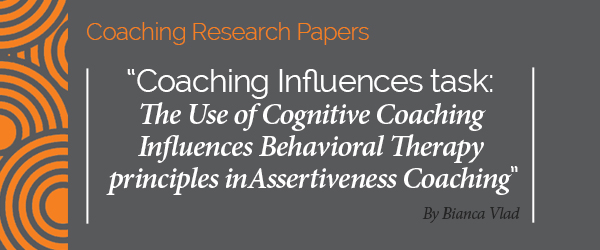 Research Paper By Bianca Vlad
Research Paper By Bianca Vlad
(Life Coach, ROMANIA)
Case study
Cognitive Behavioral Therapy (CBT) focuses on the relationship between behavior, feelings and thoughts. The CBT essential principle states that the way we act is a result of the way we feel, which in turn, is a result of the way we think / interpret a particular situation. Some of the coaching concepts like underlying beliefs, reframing perspective, visualization come from the same school of thought as CBT. In brief, CBT looks at how to manage problems by changing our thought processes and thereby our behavior. In coaching, this is relevant because the coaches need to understand how their clients view the world around them. CBT usually focuses more on the current situation and its solution, rather than the past, on a person’s views and beliefs about their life, rather than personality traits.
One of the key topics in CBT is the assertive behavior. Assertiveness can be defined as communication in which one expresses oneself in a direct and honest manner in interpersonal situations, while simultaneously respecting the rights and dignity of others. The principle behind assertiveness is that we all have the right to express our thoughts, feelings and needs to others, as long as we do it in a respectful way. When we feel like we cannot express ourselves openly, we may become depressed, anxious, or angry, and our self-esteem may suffer. Our relationships with other people are also likely to suffer because we may become resentful when they don’t read our minds for what we are not assertive enough to tell them.
There are no strict rules of what assertive behavior is; it depends on the situation, culture and context. In other words, behavior that is appropriately assertive for one person in one situation may be either excessively passive or too aggressive for someone else in a different situation.
Also, very important in the coaching context is the fact that assertiveness is not something we are born with, but it is a learned behavior. Although some people may seem to be more naturally assertive than others, anyone can learn to be more assertive. Essentially the assertiveness is the middle point between passiveness and aggression. In interpersonal situations, passive behavior occurs when you focus on the needs and desires of another person, but ignore your own needs and wishes. In contrast, aggressive behavior occurs when you force your own needs on others. Assertive behavior involves expressing your own way of seeing things, but in a way that is respectful of the other person. Although no one can guarantee that the other person will like what you do or say, assertive behavior requires that the other person be treated with respect. Beside passiveness and aggression, there is also a mixed type of non-assertive behavior called passive – aggressive behavior. Rather than speak or act directly, this behavior involves masking aggression to avoid accepting responsibility for the consequences of one’s behavior (for example, the employee “forgets” to send the report to their manager). Sometimes such things really happen and people have legitimate excuses. Behavior becomes passive-aggressive if the person really wishes or acts towards a bad outcome. Finally, assertive behavior is different than the manipulative behavior; the later one supposes that the persons obtain what they want by making other people feel guilt or compassion towards them, while they pose as victims.
There are few people who manage to be assertive in all areas of their lives. Some of us may be assertive at work but experience difficulties with our personal relationships; others may cope well within their personal relationships, but lack assertive skills at work. Being assertive doesn’t mean you will obtain what you want from others in all situations. The assertive persons evaluate situation, decide how to act, and respond without anxiety or guilt. They respect themselves and other people and take responsibility for their actions and decisions. They are aware of what they want and ask for it in an open manner. If refused, they of course feel disappointed, but they don’t let this affect their self-esteem.